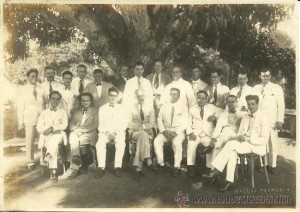THE RETURN OF THE CATALAN TO CUBA.
Saddled with an uncomfortable fame slave, but also skilled traders, workers of stubborn and stingy. If you have cold approaching a stove, but only light up when they are about to die frozen. It is said that produced the first copper wire when, finding a Spanish peseta, two of them pulled to opposite sides wanting to take it every man for himself. Anyway, whenever we speak of a people, the foundation of his character is a concoction of bad jokes, urban legends and seasoned with some truth bias. The one fact no doubt, because scientific data attest, is that without the presence of Catalan in Cuba, today our history would be different. And it would be another story of Catalonia, enriched in no small part thanks to the businesses of its emigrants to the Greater Antilles.
Perhaps imbued with entrepreneurial spirit of adventure or, also they call him now- last February, the Chamber of Commerce of Sabadell, Barcelona, organized a meeting of Catalan businessmen with government entities in the Habana.No were the first to get here, of course. Most of Spanish firms currently operating in Cuba (especially in tourism) have a significant equity interest from companies, banks, private equity and financial Catalan, although its offices may be recorded in Mallorca, the Basque Country or Madrid.
During the colonial period, and despite its late appearance on the island, the Catalans came to constitute 72% of all Spaniards settled in the colony. They controlled not only the lucrative slave, but a good part of the manufacture and marketing of Cuban sugar in the international market; tobacco production and manufacture of some of its most famous cigars; copar apart from almost all retail here, where to announce he was going to the winery, said, “I’m going to Catalan corner”.
Given this background, the question then falls under its weight: the Catalans back at him in Cuba? In fact, they returned. Reconciliation of the regime with foreign capital, in the early 90s of last century, was in principle with the enthusiasm of investors in the region.
In 2014, Catalan exports to Cuba totaled 196 million euros, 10% more than in 2013, but if you stick to the statements of some members of that delegation from the Chamber of Commerce of Sabadell (first Spanish after the announcement of dialog made last December 17 from Washington and Havana), lifting the embargo would cast Catalan interests beyond the Cuban market, the succulent Caribbean and turn our country into an ideal logistics base to be dedicated to make their exports to most of the continent, including the North American east coast, the strip with higher consumption of the world.
Jordi Cabarrocas remembrances. 
Just a sample, right now, may be the case Cecauto, Catalan company based in Viladecans, Barcelona, who for ten years supplies spare parts to the automotive sector in our market and that (according to publicly announce their own managers) plans for next September, begin operating the first private public transport on the island, a bet of business for which today no one would risk here a tight kilo. Although, as Peter Drucker said, considered the father of the discipline of management in the twentieth century, “where a successful business, someone once made a risky decision.”
DDC / J.Hugo Fernandez / M.Rossi, Havana /Excerpts/ InternetPhotos / TheCubanHistory.com
The Cuban History, Hollywood.
Arnoldo Varona, Editor.
EL REGRESO DE LOS CATALANES A CUBA.
Cargan con una incómoda fama de negreros, pero también de hábiles negociantes, de tozudos trabajadores y de tacaños. Si tienen frío se acercan a una estufa, pero solo la encienden cuando se ven a punto de morir congelados. Se cuenta que produjeron el primer hilo de cobre cuando, al hallar una peseta española, dos de ellos tiraron para lados opuestos queriendo llevársela cada cual para sí. En fin, siempre que se habla de un pueblo, el fundamento sobre su carácter es un mejunje de chistes malos, leyendas urbanas y prejuicios sazonados con algo de verdad. De lo que sí no hay dudas, porque lo atestiguan datos científicos, es de que sin la presencia de los catalanes en Cuba, hoy nuestra historia sería otra. Y sería otra la historia de Cataluña, enriquecida en no poca medida gracias a los negocios de sus emigrados a la mayor de las Antillas.
Imbuidos quizá por su espíritu aventurero —o emprendedor, que también así le llaman ahora— el pasado mes de febrero la Cámara de Comercio de Sabadell, en Barcelona, organizó un encuentro de empresarios catalanes con entidades del Gobierno en La Habana.No eran los primeros en llegar aquí, naturalmente. La mayor parte de firmas españolas que operan actualmente en Cuba (sobre todo en el turismo) cuentan con una importante participación de capital procedente de empresas, bancos, capital privado y financieras catalanas, aunque su domicilio fiscal puede que conste en Mallorca, el País Vasco o Madrid.
Durante la etapa colonial, y a pesar de su tardía aparición en la Isla, los catalanes llegaron a constituir el 72% de todos los peninsulares asentados en la colonia. Controlaban no solo el lucrativo negocio negrero, sino una buena parte de la fabricación y comercialización del azúcar cubano en el mercado internacional; la producción tabacalera y la fabricación de algunas de sus más afamadas vitolas; aparte de copar casi todo el comercio minorista de aquí, donde para anunciar que se iba a la bodega, decían: “Voy al catalán de la esquina”.
Dados tales antecedentes, la pregunta entonces se cae por su peso: ¿volverán los catalanes a por lo suyo en Cuba? De hecho, ya volvieron. La reconciliación del régimen con el capital foráneo, a principios de los años 90 del siglo pasado, contó en principio con el entusiasmo de los inversionistas de esa región.
En 2014, las exportaciones catalanas a Cuba alcanzaron los 196 millones de euros, 10% más que en 2013, aunque si nos atenemos a las declaraciones de algunos miembros de la mencionada comitiva de la Cámara de Comercio de Sabadell (primera española tras el anuncio de diálogo hecho el pasado 17 de diciembre desde Washington y La Habana), el levantamiento del embargo proyectaría los intereses catalanes más allá del mercado cubano, al suculento Caribe, y convertiría a nuestro país en una idónea base logística desde la que se dedicarían a realizar sus exportaciones a casi todo el continente, incluida la costa este norteamericana, la franja con mayor consumo del orbe.
Un botón de muestra, ahora mismo, puede ser el caso de Cecauto, compañía catalana domiciliada en Viladecans, provincia de Barcelona, que desde hace diez años suministra piezas de recambio al sector automovilístico en nuestro mercado y que (según anunciaran públicamente sus propios directivos) planea, para el próximo mes de septiembre, comenzar a operar el primer servicio privado de transporte público en la Isla, una apuesta de negocio por la que hoy por hoy nadie arriesgaría aquí ni un kilo prieto. Aunque, como dijo Peter Drucker, considerado el padre de la disciplina del management en el siglo XX, “donde hay una empresa de éxito, alguien tomó alguna vez una decisión arriesgada”.
DDC/J.Hugo Fernandez/M.Rossi, La Habana/Extractos/InternetPhotos/TheCubanHistory.com
The Cuban History, Hollywood.
Arnoldo Varona, Editor.



 THE RETURN of the CATALANS to Cuba. *** EL REGRESO de los CATALANES a Cuba.
THE RETURN of the CATALANS to Cuba. *** EL REGRESO de los CATALANES a Cuba.

